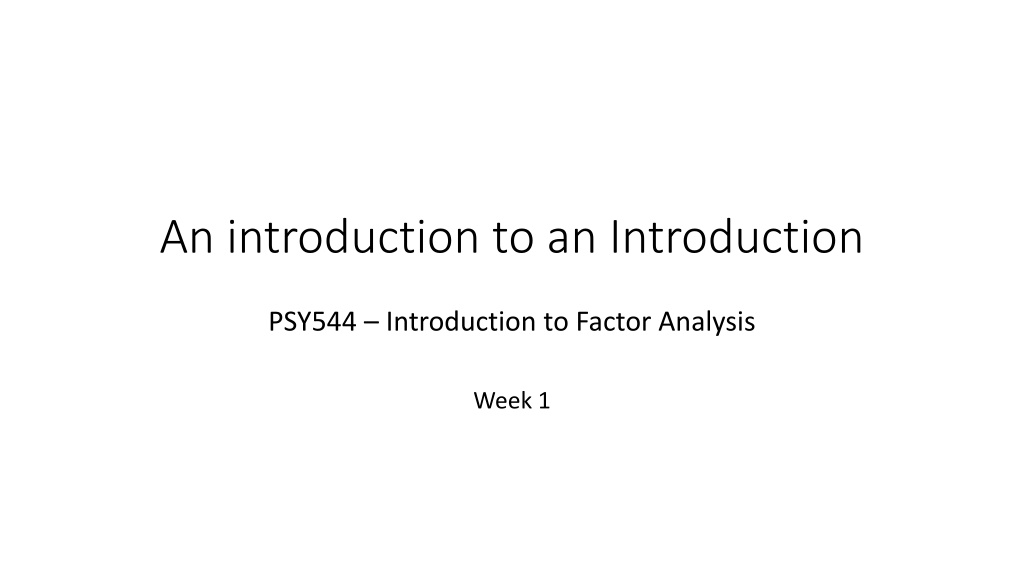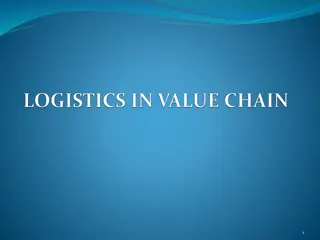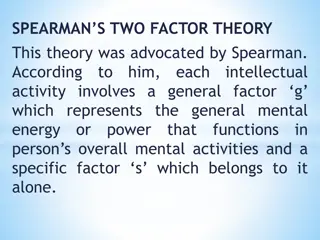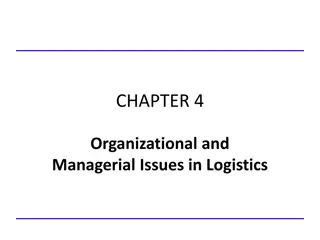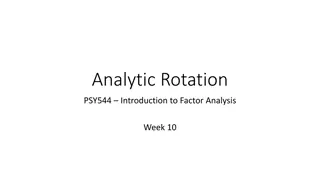An Introduction to Factor Analysis: Course Logistics for PSY544
This course in PSY544 introduces students to factor analysis with a focus on understanding the statistical theory behind the model. Taught in English, the course covers lecture times, prerequisites, math requirements, and grading criteria. Emphasizing the inner workings of factor analysis, it aims to train students to be informed factor analysts by delving into how factor analysis works rather than solely focusing on application. Participation, homework assignments, and an exam make up the grading criteria.
Download Presentation

Please find below an Image/Link to download the presentation.
The content on the website is provided AS IS for your information and personal use only. It may not be sold, licensed, or shared on other websites without obtaining consent from the author. Download presentation by click this link. If you encounter any issues during the download, it is possible that the publisher has removed the file from their server.
E N D
Presentation Transcript
An introduction to an Introduction PSY544 Introduction to Factor Analysis Week 1
First off.....English! This course is taught in English (yay!) for many reasons All lectures, all homeworks, all e-mails, the exam... Even though I do speak Czech, please no Czech in class or in your coursework Am I too fast? Am I too slow? Do I mumble? Do I sound funny? Tell me.
Course logistics Lecture times are Mon (P22) + Wed (U34), 18:00 18:50 4 credits
Course logistics No official requirements, but At least an elementary stats course (correlation, linear regression, partial correlation, multiple regression) Some knowledge of R is great (we ll need it later on, you have time) If you re not so sure, please catch up/refresh; I will assume you did
Course logistics Math! We will learn a bit of matrix algebra, it s EASY (might be a review for some of you) But yes, this course will be more math-y than most PSYCH courses. Don t worry, even if you think you suck at math.
Course logistics Usually, courses focus on how to use factor analysis, how to interpret it, how to report it all the nitty-gritty of application This course will, instead, put much more stress on how does factor analysis work and what is the (statistical) theory behind the model. While this course will not offer you a cookbook for doing factor analysis, it will empower you to understand the inner workings of factor analysis and will train you to be an informed factor analyst.
Course logistics In other words, I won t spend a lot of time teaching you how to drive but I will spend a lot of time teaching you how does the car work.
Course logistics Requirements: Participation (will be somewhat monitored, no strict rules for the moment ) Homework (three short homework assignments, 20% of grade) Exam (take-home, 40% of grade) Grading criteria in the syllabus
Course logistics Academic misconduct no copying, no teamwork on assignments, no plagiarism. Pretty please. Course materials: Notes (presentations) will be given ahead of time, bring them if you wish No other material is necessary, but feel free Please talk to me if you need anything or feel lost. Communication is key.
Course logistics A slightly different course. Relatively speaking: More frequent More frontal Less time spent on assignments NO group projects (does anyone even like those?) Narrower scope, but much more in-depth
Course content First: Factor analysis at-a-glance Definition and review of key terms, ideas and concepts A bit of history (a very tiny bit) Scalars, vectors and matrices Basic vector and matrix operations and functions (Assignment 1) + Review your Greek /
Course content Second: The model (The Unrestricted [Exploratory] Common Factor Model) The methodology (Fitting the model, Estimation, Rotation, Fit) The software! (CEFA) (Assignment 2)
Course content Third: Still the same old model (The Restricted [Confirmatory] Common Factor Model) The methodology (Constraints, Identification, Fit) The software! (lavaan) (Assignment 3)
Course content Further (if time permits): Special topics and extras
Course objectives At the end of the semester, you will: Have a solid understanding of the theory behind EFA and CFA Become an informed data analyst when performing FA Be able to use major software for EFA and CFA Be able to interpret and communicate EFA and CFA results Be able to evaluate other people s work
